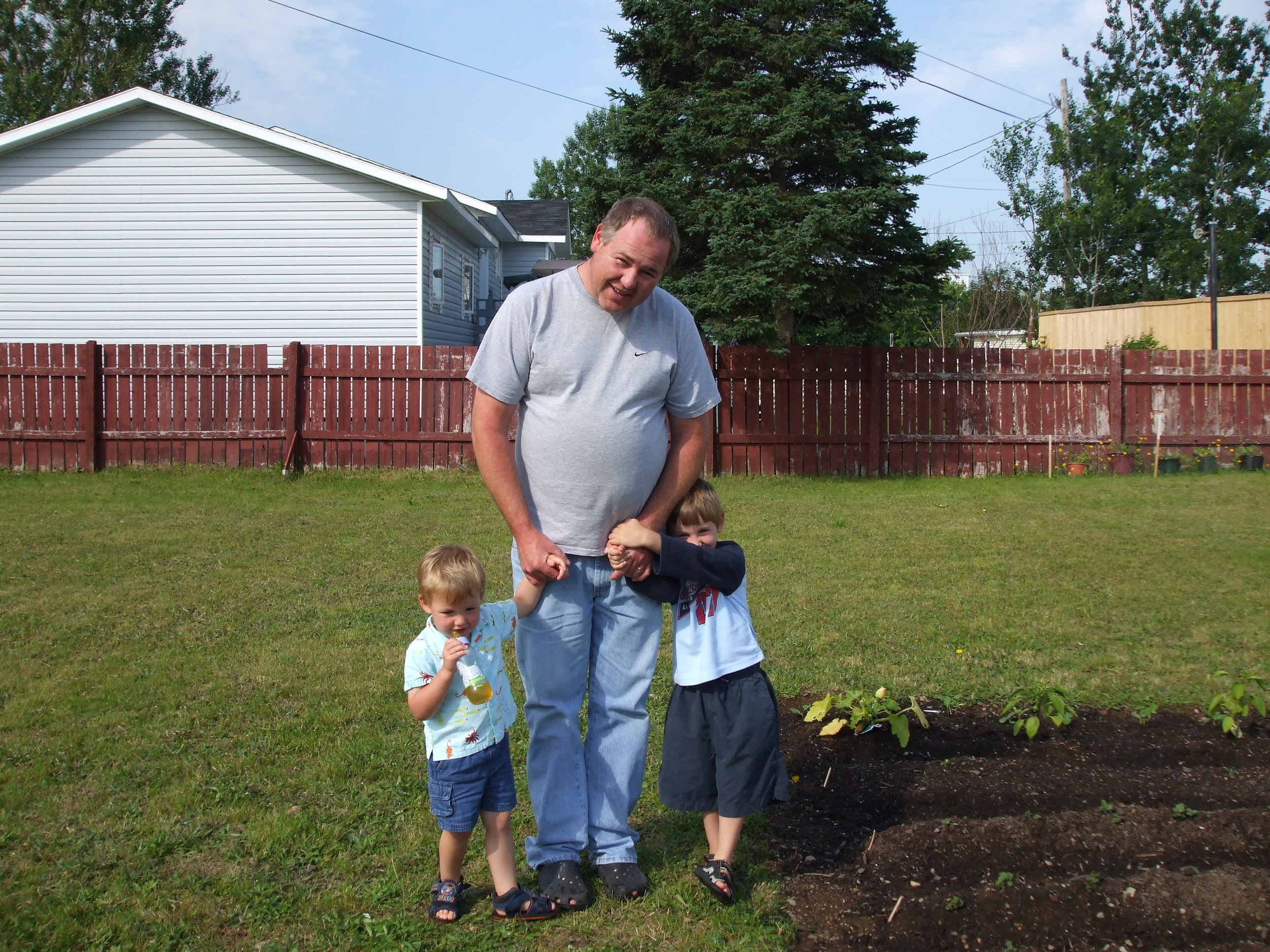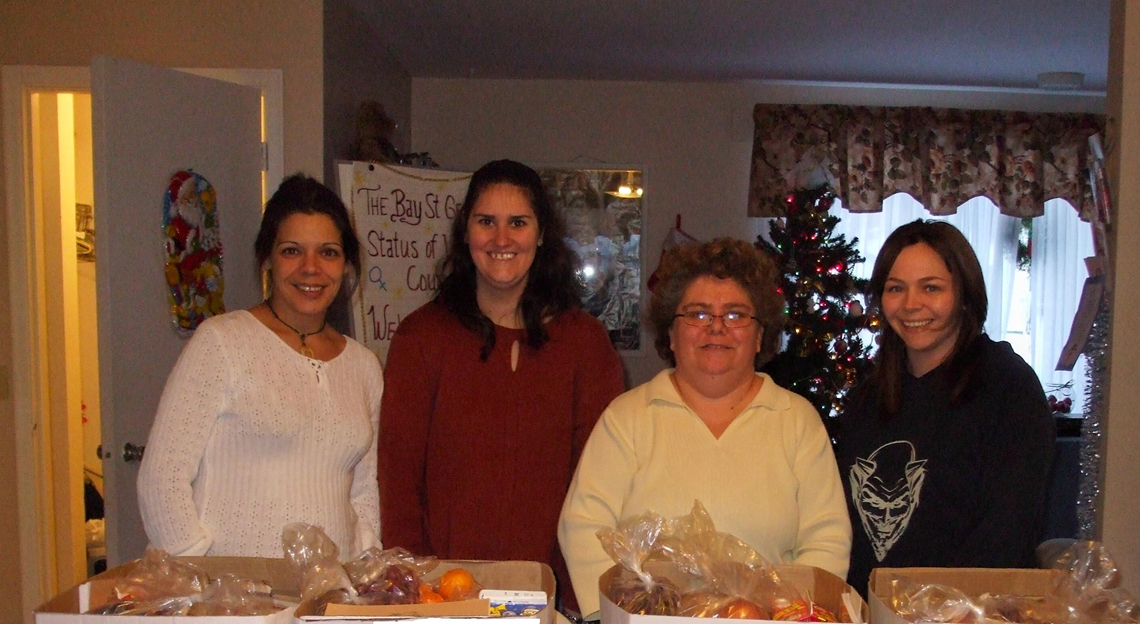 The Level Best Bulk Buying and Cooking Club in Stephenville is weaving together multiple strategies to help families eat healthier. The Club, sponsored by the Stephenville Family Resource Centre and the Bay St. George Status of Women Council, has run since 2009. The program involves bulk buying, cooking sessions, and a community kitchen garden.
When it started, its objectives were to provide a supportive environment for sharing and learning, to increase knowledge and skills of food purchasing and preparation, and to foster a support network for families. Bernice Hancock, Program Director at the Community Action Committee for Southwestern Newfoundland, which runs the Family Resource Centre, says “The need has always been there. The cost of basics such as milk, bread, and vegetables has gone up so greatly in the last 5 years. Having run Healthy Baby Clubs in the area for a long time we have seen the role that nutrition plays.”
The Level Best Bulk Buying and Cooking Club in Stephenville is weaving together multiple strategies to help families eat healthier. The Club, sponsored by the Stephenville Family Resource Centre and the Bay St. George Status of Women Council, has run since 2009. The program involves bulk buying, cooking sessions, and a community kitchen garden.
When it started, its objectives were to provide a supportive environment for sharing and learning, to increase knowledge and skills of food purchasing and preparation, and to foster a support network for families. Bernice Hancock, Program Director at the Community Action Committee for Southwestern Newfoundland, which runs the Family Resource Centre, says “The need has always been there. The cost of basics such as milk, bread, and vegetables has gone up so greatly in the last 5 years. Having run Healthy Baby Clubs in the area for a long time we have seen the role that nutrition plays.”
The Level Best Club changes from year to year according to the funds available at the time. The Level Best model was developed in the St. John’s area, and expanded to 5 communities across the province with funding from the Provincial Wellness Program. Bernice says when they were asked to participate they jumped at the chance. Since then the program has continued in Stephenville through regional grants, business donations, and the Community Action Committee’s core funding.
The bulk buying sessions give parents the opportunity to access affordable healthy food by purchasing in bulk with other participants. Families each contribute half the cost of their food and the project covers the rest. Participants collectively create a shopping list of nutritious food and essential household items, which are purchased by a coordinator and volunteer from the group. Some past Stephenville Level Best Club participants have gone on to be volunteer coordinators of the program. Bernice says the bulk buying club allows participants with low incomes to stretch their budgets.
 Participants in the Level Best Club also have cooking sessions and grow some of their food in a garden located on the property of the Bay St. George Women’s Centre. Bernice explains that many of the young moms they work with don’t have the cooking skills to prepare healthy meals. Six to eight families are given a Basic Shelf Cook Book and basic cooking utensils, then the group selects recipes and prepare meals together. The hands-on gardening activities often work with the cooking sessions so that participants follow their food from seed to plate.
Participants in the Level Best Club also have cooking sessions and grow some of their food in a garden located on the property of the Bay St. George Women’s Centre. Bernice explains that many of the young moms they work with don’t have the cooking skills to prepare healthy meals. Six to eight families are given a Basic Shelf Cook Book and basic cooking utensils, then the group selects recipes and prepare meals together. The hands-on gardening activities often work with the cooking sessions so that participants follow their food from seed to plate.
Participants in the program are drawn from the Family Resource Centre’s Healthy Baby Clubs and programs at the Bay St. George Women’s Centre. Another important partner in the program which also refers participants is the Pathfinder Learning Centre, which provides specialized school programs for at risk individuals over the age of 16.
The participants also go on food label reading tours at local grocery stores with a dietitian. The combination of increased cooking skills, knowledge about nutrition, being more aware of how to stretch your food dollar, hands-on learning, peer support, and learning about other programs in the community all contribute to success for these participants. “People had the idea that buying fresh vegetables, or healthy food, was more expensive. We do a comparison of that and then they realize that they can afford to buy healthy food" explains Bernice.
"One mom said: ‘I don’t like to cook, but now I have to, because the children really enjoy the food.’ She is motivated now, and they’re enjoying meals together.” Bernice says that feedback for the program has been very positive. Coordinators conduct before and after evaluation with each cohort to measure knowledge and skills gained.
For more information about the Level Best Club, contact the Community Action Committee for Southwestern Newfoundland at 709-643-5399 or bsgcacnf@nfld.net.
This article is an excerpt from the FSN Community Report. For more information about how to start and run a bulk buying club, community garden or community kitchen check out the FSN Best Practices Toolkits.


